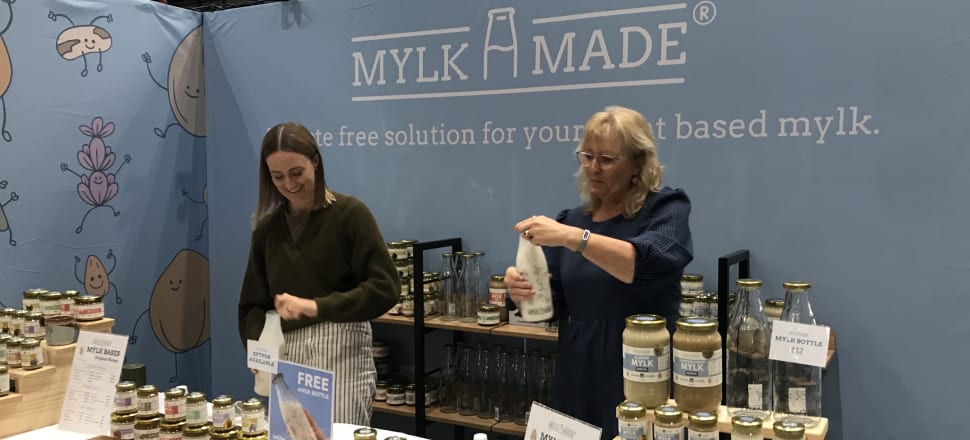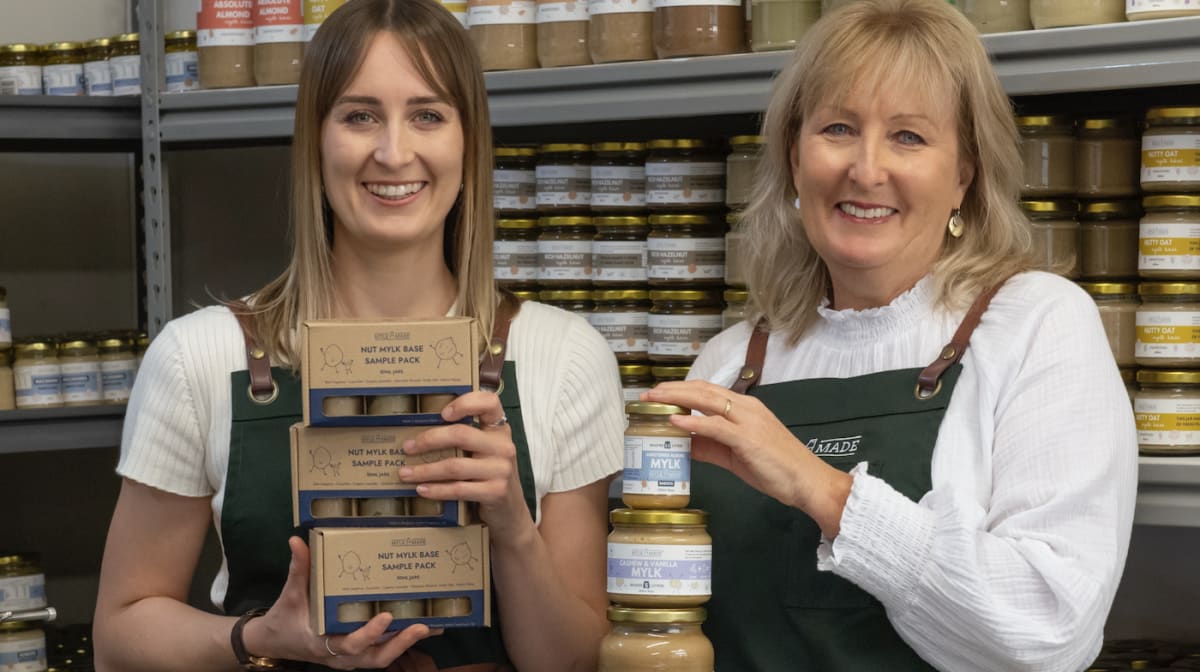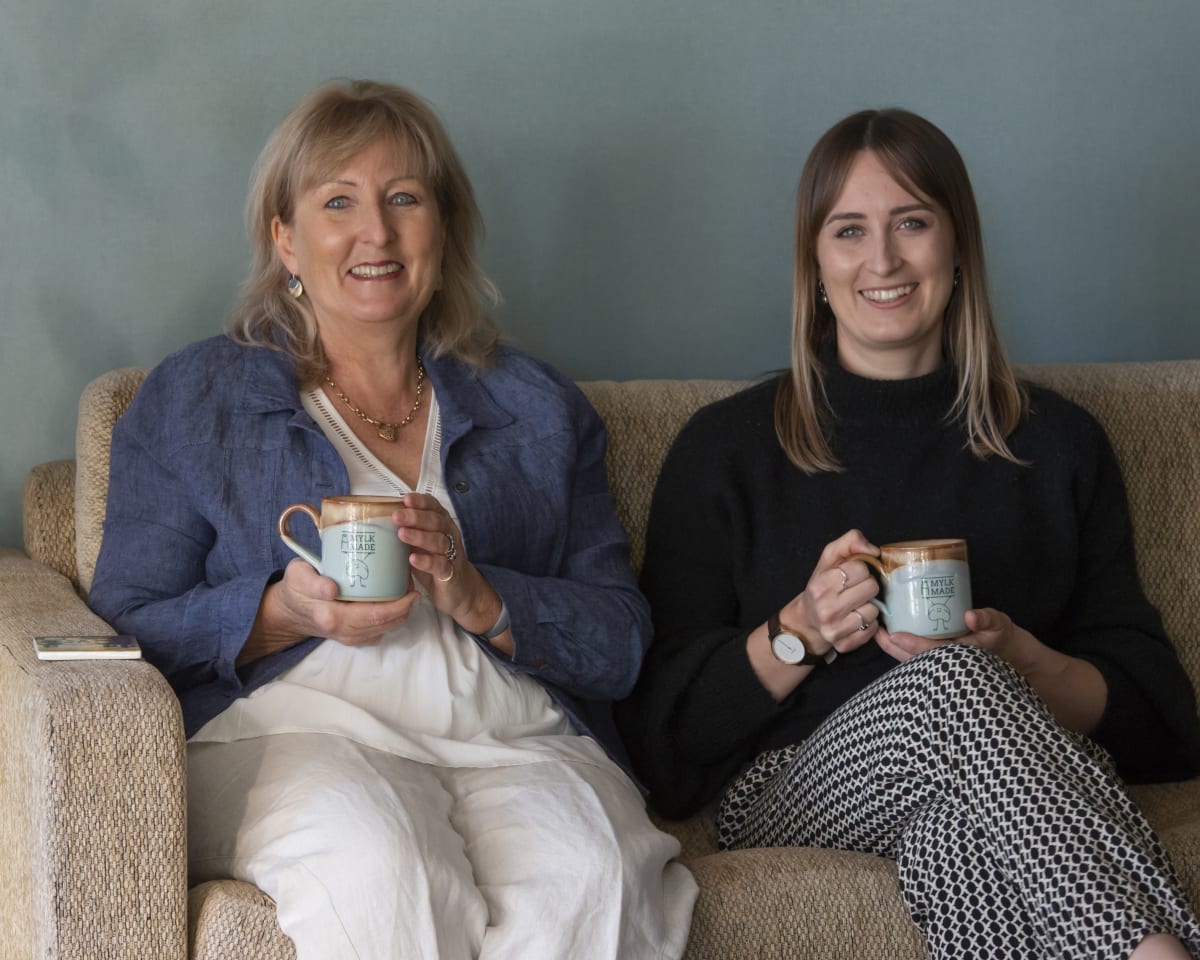
A Canterbury-based mother-daughter nut milk business is challenging not only the dairy sector but also competitors selling milk alternatives in plastic bottles or hard-to-recycle Tetra Pak cartons
It’s Saturday morning, 10 minutes before doors open for day one of the weekend-long Go Green Expo. And it looks like chaos is about to break loose.
Punters are queuing round the block, lured by the promise of “your one-stop shop for everything you need to live a sustainable life”. Their health food-fuelled children are running amuck, an older visitor – perhaps over-enthusiastic about the excitements of the day – is being helped up off the ground.
Inside, it’s the calm before the storm. The rows of booths offering everything from health and beauty products, to food and beverage, to home and building products are empty of visitors for the moment; founders and marketing staff are readying for the crowds and at least seven hours on their feet, two days in a row.
READ MORE: * A bite of the profits: Women growing new food brands endure heat in the kitchen * The more you know about waste, the less you sleep at night
Mother and daughter team Corinne and Jemma Turner have done it all before. They started their dairy-free milk company Mylk Made in 2020 and since then have been using events like this as a way to market an unexpected concept to potential customers; customers who have plenty of choice when it comes to alternative milks. Oat milks, nut milks, soy, rice, coconut …
Mylk Made’s point of difference is its product comes as a nut or seed milk paste in a jar. You scoop out some concentrate, add water, blend, and put your ‘mylk’ into a branded Mylk Made bottle and into the fridge. When that batch is finished, you rinse and repeat – literally. The rest of the concentrate goes back into the cupboard until next time.

But why? As Jemma and Corinne know all too well, milk-in-a jar is not a straightforward sell to a population used to buying their alternative milk (and of course their dairy milk) ready to use, with the 97-98 percent water content handily already mixed in there. Why would you go through the effort of adding water and blending it, when the manufacturer could do it for you?
The answer, the Turners say, is about sustainability. Their product is more environmentally friendly because it avoids moving stuff which is mostly water around the country. And it avoids using plastic bottles or Tetra Pak-style plastic/cardboard/aluminium cartons, most of which end up in landfill.
Mylk Made encourages customers to return their jars using a voucher system, so they can be refilled.
It's hard to avoid parallels between Mylk Made and NZ beauty brand Ethique, which began with founder Brianne West’s goal of ridding the world of plastic bottles. West's solution was to sell her shampoo as a solid bar in cardboard packaging, instead of as a liquid in a plastic bottle. (Ethique, which was started at West’s kitchen table in 2012, is now a $100 million-plus, largely US private investment-owned company which has, according to its own calculations, saved 25 million plastic bottles from landfill.)
It all started in the shed
Jemma Turner says the Ethique story has been inspirational. Mylk Made began in 2018 when, having recently quit her project manager job at an engineering company, Turner and her builder partner Max moved to Indonesia for a year.
West was shocked by the quantities of plastic waste she saw on the streets and in the seas and waterways. At the same time she was intrigued by a ground nut milk concentrate product served at a local café.
Back home, she decided she'd had enough of the corporate world and enlisted the help of her parents, who were serial business owners and entrepreneurs from way back to start her own business. (Fun fact: one of Corinne and Keith’s earliest ventures, a fruit and veggie company, grew grapes and sold some of the first bottles of wine for Jane and Ernie Hunter of Hunter’s Wines.)
As Jemma’s mylk idea took shape, her father reluctantly gave up his shed on their Rangiora property, and Max converted some of it into a food manufacturing premises. Corinne, ostensibly retired, joined the company full time.

From two small, benchtop nut grinders three years ago producing up to 20 300ml jars a day, the pair now have four large imported machines with a big stainless tank on top, a motor on the bottom, a granite plate and big stone rollers.
“I say to people to visualise a concrete mixer,” Corinne says. “You put the nuts into that and it slowly grinds them down into a liquid paste, and we pour it out, just like you might pour concrete from a concrete mixer.
“On Thursday last week we filled 400 jars.”
As the business has grown and the number of nut/seed mixes has increased from two to eight, so Max has gradually expanded the Mylk Made kitchen so it now fills the whole shed. The business now has a handful of employees and is working with the NZ Food Innovation Network on a new – and secret – product range due out next year.
In February, the company expanded out of Te Waipunamu, appointing a distributor for the North Island, and next month the pair head to Sydney for the Naturally Good expo.
“Hopefully we will get picked up by a distributor or there'll be lots of interest from the Australian market,” Jemma says.
Two months in, Corinne says the North Island is proving a harder nut to crack than the South.
“We’ve got six or seven New World stores on board so far, but the biggest challenge for our business is educating people that you don’t have to buy your nut milk or plant milk in a carton or Tetra Pak. There’s another option that’s sustainable, eliminating that waste and nutritionally is good for you because we use natural ingredients and none of the gums, stabilisers, additives and oils that you often get in carton Tetra Pak.”
“The café and hospitality industry is one of the biggest waste producers. Think about how much difference we could make. It’s crazy numbers.” Jemma Turner, Mylk Made
Another challenge is getting café owners on board. At the moment, 80 percent of Mylk Made sales are through supermarkets or online; only 20 percent is from cafés and restaurants.
Does that matter, I ask, if they can grow the business without those reluctant café owners?
Yes it does, Jemma says. Not because of Mylk Made’s bottom line, but because of that other goal – saving the world.
“The café and hospitality industry is one of the biggest waste producers. Think about how many cartons cafés in New Zealand go through every day, and how much difference we could make. It’s crazy numbers.”
Like Ethique and its 25 million plastic bottles saved from landfill, the Turners are working on quantifying the company’s impact as a first step to increasing it.
The pair are two thirds of the way through a programme to get the company B Corp certification – and putting numbers behind social and environmental claims is part of the B Corp ethos.
B Corp is not for the faint-hearted. After two days behind a stand at the Go Green expo, Corinne and Jemma were returning to Rangiora to do an intensive week of B Corp admin, on top of their normal production cycle.
READ MORE:
* The tough road to becoming a B Corp
* Circular economy: Breaking our take-make-waste model
Then there’s the critical work entering the various food and sustainability awards run over the year. It’s not just about kudos – it’s about those all-important gold stickers they have on their jars to give their product credibility with customers.
Mylk Made won two golds and a silver in the recent Outstanding NZ Food Producer Awards.
It’s time-consuming, but that’s what being an SME founder is all about.
“Keith and I have had seven-day-a-week businesses all our lives,” Corinne says. “Who runs a business and only works part time?”








